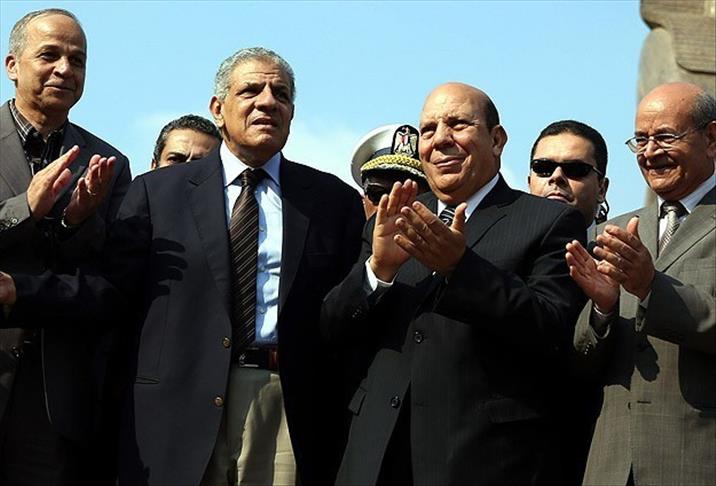
CAIRO
The appointment of outgoing Housing Minister Ibrahim Mehleb as new interim prime minister drew mixed reactions from political forces that support Egypt's military-backed authorities.
On Tuesday, Mehleb was tasked by interim President Adly Mansour with naming a new cabinet. The move followed the abrupt resignation of premier Hazem al-Beblawi and his government one day earlier.
"Mehleb's government will bring nothing to the table," Wahid Abdel-Meguid, leading member of the National Salvation Front, Egypt's main secular umbrella group, told Anadolu Agency.
"The choice of Mehleb as new PM will mean a replication of the previous government," Abdel-Meguid said.
Mehleb, a 65-year-old engineer by profession, will replace al-Beblawi, a former finance minister appointed last July after the army ousted president Mohamed Morsi – Egypt's first freely elected leader – following protests against presidency.
Al-Beblawi's cabinet resignation comes ahead of anticipated presidential polls, the second phase of a military-imposed roadmap unveiled in the wake of Morsi's ouster.
Mehleb will lead the fifth cabinet to be appointed in the three years since Egypt's January 2011 uprising, which ended the 30-year rule of president Hosni Mubarak.
"All cabinets appointed since Mubarak's ouster have been the same," Abdel-Meguid said. "They were all chosen in the same way, worked without a tangible plan, and served only a few segments of society."
Ahmed Fawzi, secretary-general of the Egyptian Social Democratic Party, of which al-Beblawi was a leading member, said the choice of Mehlab reflected an intent to hire an "employee" prime minister, rather than a politician.
"It's a return to the characteristics of Mubarak-era governments," Fawzi told AA.
"It's also a message to the public that having politicians in top government posts led to the country's current situation, despite the efforts of the Beblawi's cabinet," he said.
In the run up to al-Beblawi's Monday resignation, Egypt was hit by a fresh wave of labor strikes in vital sectors including healthcare and public transport.
In his brief resignation speech, al-Beblawi cited "great dangers" facing the country.
According to Fawzi, Mehleb "has been groomed for the post by the inner circles of Egypt's political and media elite, which prompted al-Beblawi's resignation."
Mohamed Fawzi, founder of Tamarod 2, the breakaway group from the Tamarod ("Rebel") signature drive that galvanized last summer's anti-Morsi protests that eventually led to his ouster, said he also sees a return to the Mubarak era through the appointment of Mehleb.
"Mehleb does not represent the January 25 principles, nor its revolutionary bloc," Fawzi told AA, citing the fact that Mehlab had been a former member of Mubarak's National Democratic Party's Policies Committee – the party's notorious inner circle.
"I feel like the country's reverting to the Mubarak era and that we need a new revolution," he said.
Towards the other end of the political spectrum, Nader Bakkar, leader of the Salafist Nour Part, which supported Morsi's ouster, believes Mehleb was a "good choice."
"During the early signs of failure for al-Beblawi's cabinet, the party had Mehleb in mind [as his successor] for his efficiency and expertise," Bakkar said in a statement following al-Beblawi's resignation.
Similarly, spokesman for the Tamarod group, Mohamed Nabawi, said the group had been calling for the appointment of Mehlab.
"He would best serve the public because he keeps away from politics," Nabawi said in a statement following Mehleb's appointment.
Egypt's military-backed interim cabinet has inherited a complex host of challenges, with the country's already ailing economy taking a further plunge against a backdrop of continuing political turmoil.
A former minister in al-Beblawi's cabinet told AA earlier that the resigned cabinet had failed to restore public security or curb surging inflation.
The premier-designate announced Tuesday following his appointment that restoring security would be his government's top priority.
He added that his government would race against time to prepare for "fair and transparent" presidential polls.
Dates for presidential elections have not yet been set.
By Hussein Qabani
englishnews@aa.com.tr
Anadolu Agency website contains only a portion of the news stories offered to subscribers in the AA News Broadcasting System (HAS), and in summarized form. Please contact us for subscription options.

